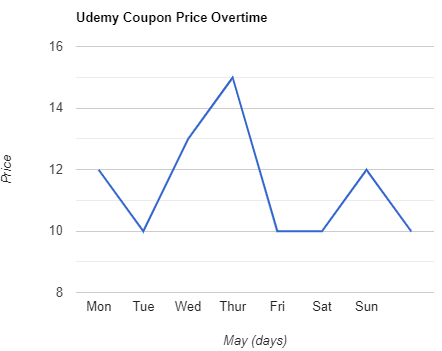High Performance Coding with .NET Core and C# (Udemy.com)
Learn how to write high performance and scalable .NET Core and ASP.NET Core applications in C#
Created by: Gergely Kalapos
Produced in 2017
 What you will learn
What you will learn
- Get an overview about the current stage of the .NET platform with focus on .NET Core, ASP .NET Core, and C# 7 with their performance aspects
- Get to know tools which are essential to measure the performance of a .NET Core application: Visual Studio Performance Tools, PerfView, BenchmarkDotNet, Perf and LTTng on Linux, Prefix, MiniProfiler
- Performance characteristics of value types and reference types, the effect of async/await on performance, and performance of collections in the base library
- Behind the scenes knowledge about C# 7: you will see what the compiler generates from C# 7 code and what performance implications this has on your application
- New performance related APIs like Span<T>, ArrayPool<T>
- Data access performance with Entity Framework Core
- Ahead of time compilation for .NET Core with CrossGen, and removing dead code with the .NET IL Linker
- Production monitoring for .NET Core and ASP .NET Core with
 Quality Score
Quality Score
Content Quality
/
Video Quality
/
Qualified Instructor
/
Course Pace
/
Course Depth & Coverage
/
Overall Score : 86 / 100
 Live Chat with CourseDuck's Co-Founder for Help
Live Chat with CourseDuck's Co-Founder for Help
Need help deciding on a visual basic .net course? Or looking for more detail on Gergely Kalapos's High Performance Coding with .NET Core and C#? Feel free to chat below.
Join CourseDuck's Online Learning Discord Community
 Course Description
Course Description
A few years ago, Microsoft decided to radically redefine the .NET platform. An open-source, cross-platform, high performance flavor of the .NET framework was created: this is .NET Core. Additionally, C#, the most widely used .NET programming language also evolved over the years. These new developments include many performance improvements.
The goal of the course is to give you deep understanding about these performance improvements. By applying the knowledge from this course, you will be able to measure and optimize the performance of .NET Core (including ASP.NET Core), C# applications.
After a short wrap-up on .NET Core the course introduces you to the first pillar of the performance topic: measuring performance. You will learn to use tools that you can apply to measure the performance of your code running on .NET Core. Then we will focus on some important performance tricks like reducing the pressure on the GC by using value types or choosing the right collection for the given problem. After that we will see what the compiler does behind the scenes when it compiles your C# 7 code and what performance implications this has. We will talk about some new performance related APIs like ArrayPool and Span and we will also look into the performance aspects of Entity Framework Core. We will talk about the ahead of time compilation story for .NET with CrossGen and IL trimming with the .NET IL Linker. We will finish the course by learning about production performance monitoring for .NET Core.
Goal of the course
Course style
The course is a mix of theory and practice. Tools and concepts with their theoretical background will be introduced with slides and then the theoretical knowledge will be applied in demos.
Who this course is for:
The goal of the course is to give you deep understanding about these performance improvements. By applying the knowledge from this course, you will be able to measure and optimize the performance of .NET Core (including ASP.NET Core), C# applications.
After a short wrap-up on .NET Core the course introduces you to the first pillar of the performance topic: measuring performance. You will learn to use tools that you can apply to measure the performance of your code running on .NET Core. Then we will focus on some important performance tricks like reducing the pressure on the GC by using value types or choosing the right collection for the given problem. After that we will see what the compiler does behind the scenes when it compiles your C# 7 code and what performance implications this has. We will talk about some new performance related APIs like ArrayPool and Span and we will also look into the performance aspects of Entity Framework Core. We will talk about the ahead of time compilation story for .NET with CrossGen and IL trimming with the .NET IL Linker. We will finish the course by learning about production performance monitoring for .NET Core.
Goal of the course
- Understanding why .NET Core and ASP.NET Core are great platforms to create high performance applications
- Learning about tools that can measure the performance of your .NET Core code: Visual Studio Performance Tools, BenchmarkDotNet, MiniProfiler, Stackify Prefix, LTTng and Perf on Linux, ETW and PerfView
- Understand the latest language features of C# and how they affect performance
- Advanced tools to improve the performance of your .NET Core and ASP.NET Core applications: Span<T>, ArrayPool<T>, ASP.NET Core Precompiled Views, Entity Framework Core performance, .NET IL Linker, AOT compilation with CrossGen.
- Performance monitoring in production for .NET Core and ASP.NET Core: Application Insights and Dynatrace
Course style
The course is a mix of theory and practice. Tools and concepts with their theoretical background will be introduced with slides and then the theoretical knowledge will be applied in demos.
Who this course is for:
- If you are a .NET Core developer and you want to make sure your application does not break under production load then this course is for you!
- Furthermore, if you are interested in performance and you like looking behind the scenes and understanding what really happens in your application then you will also find this course interesting.
 Instructor Details
Instructor Details

- 4.3 Rating
 25 Reviews
25 Reviews
Gergely Kalapos
Gergely Kalapos (Greg) is a Software Engineer specialized in .NET and Microsoft technologies. He started to work with .NET and C# around 2008 and he spent the last 4 years creating performance monitoring tools for .NET applications. He holds a BSc degree in Computer Engineering and an MSc degree in Software Engineering.







